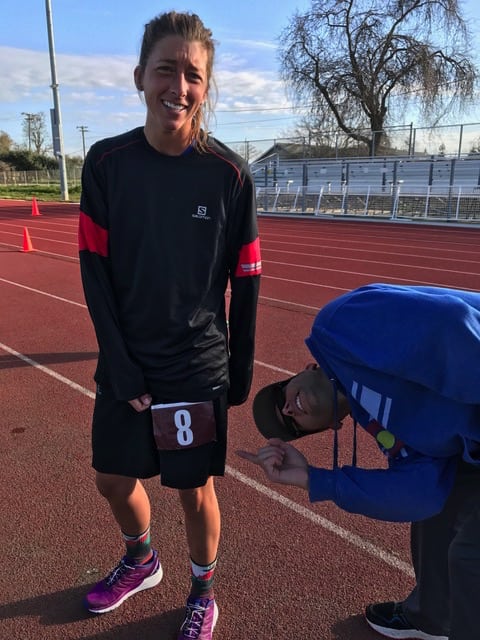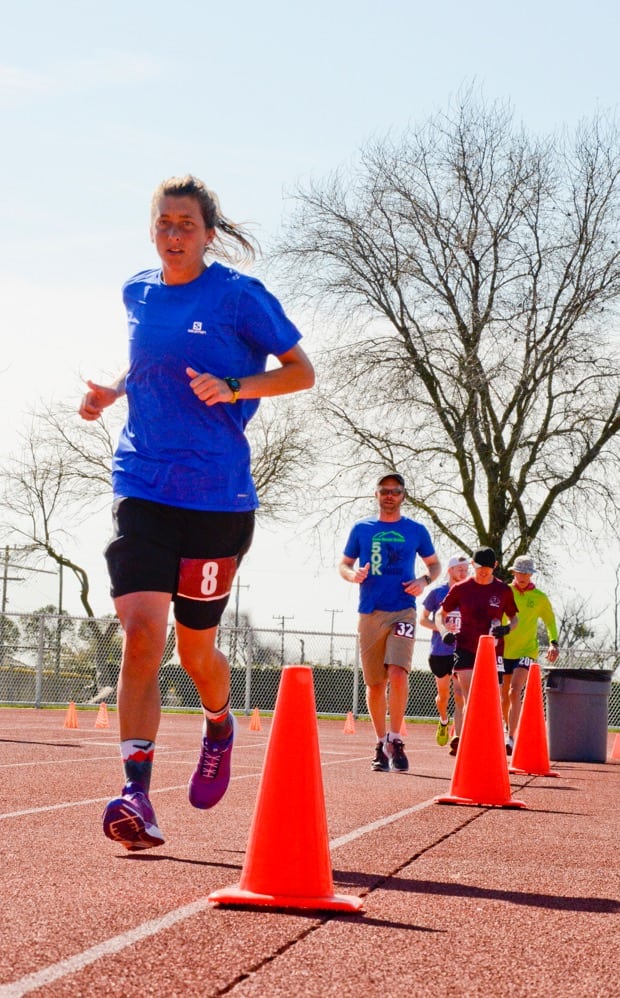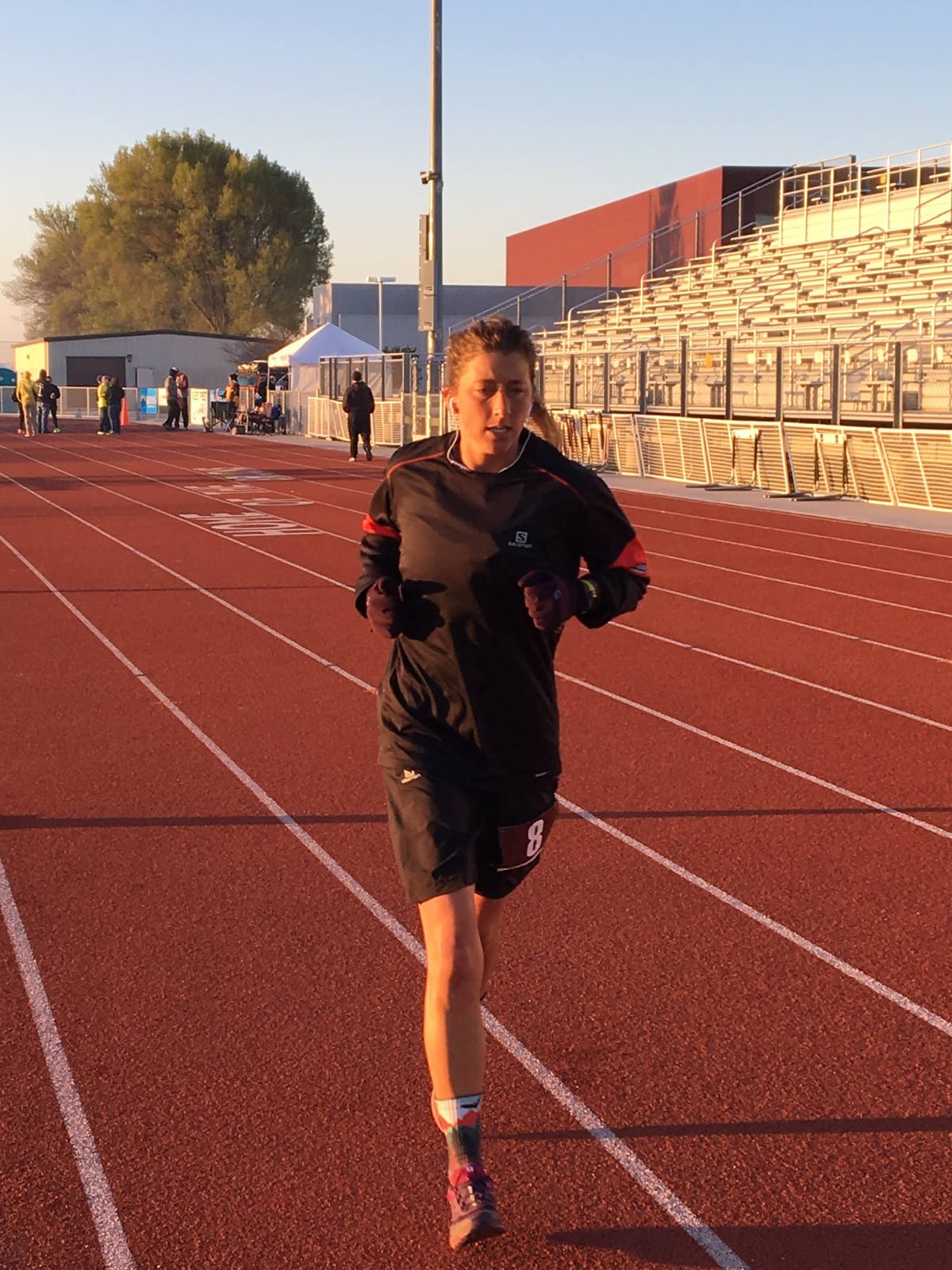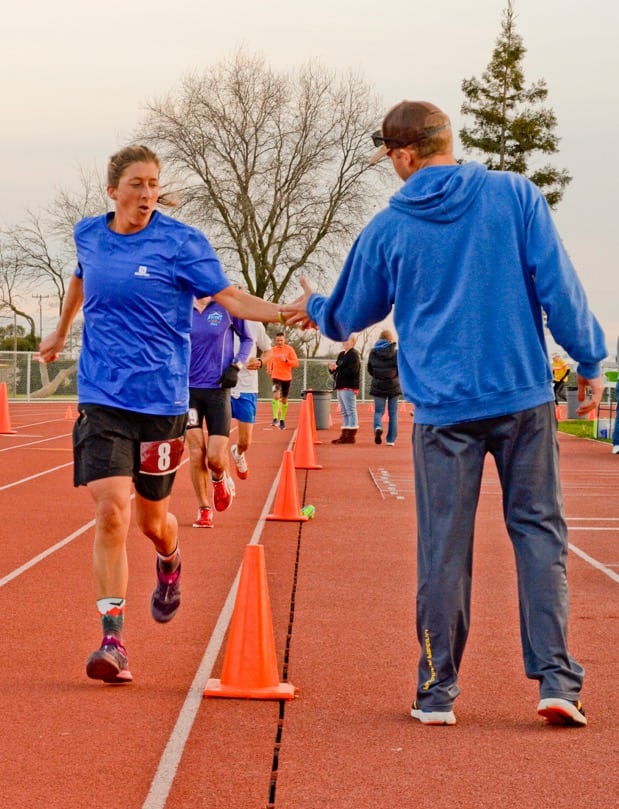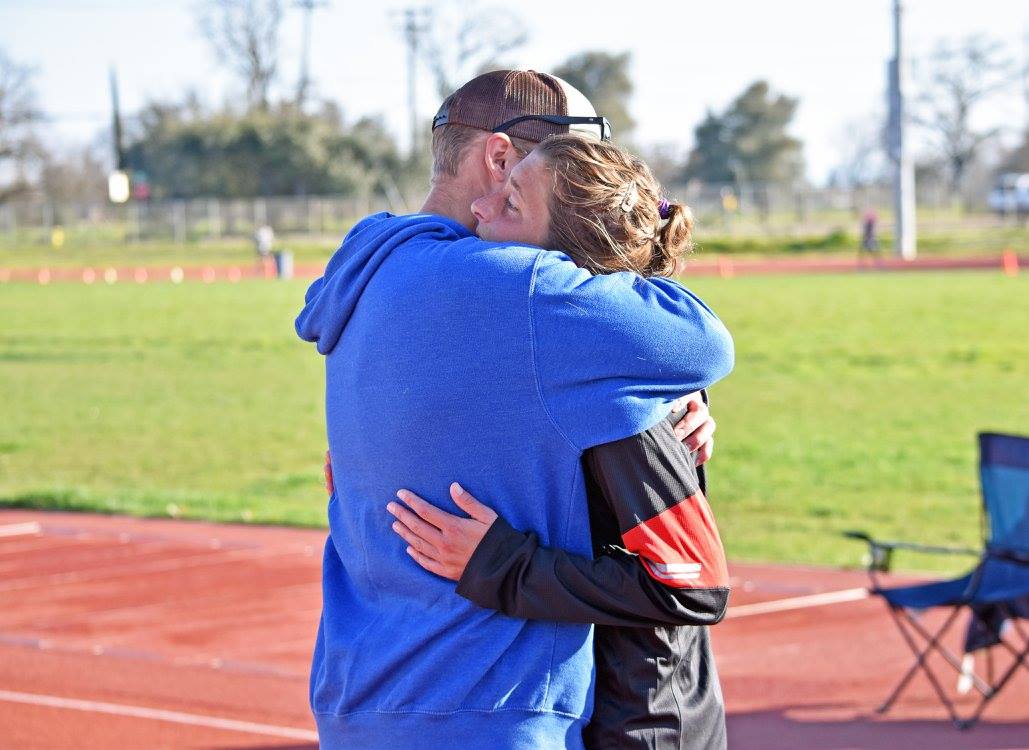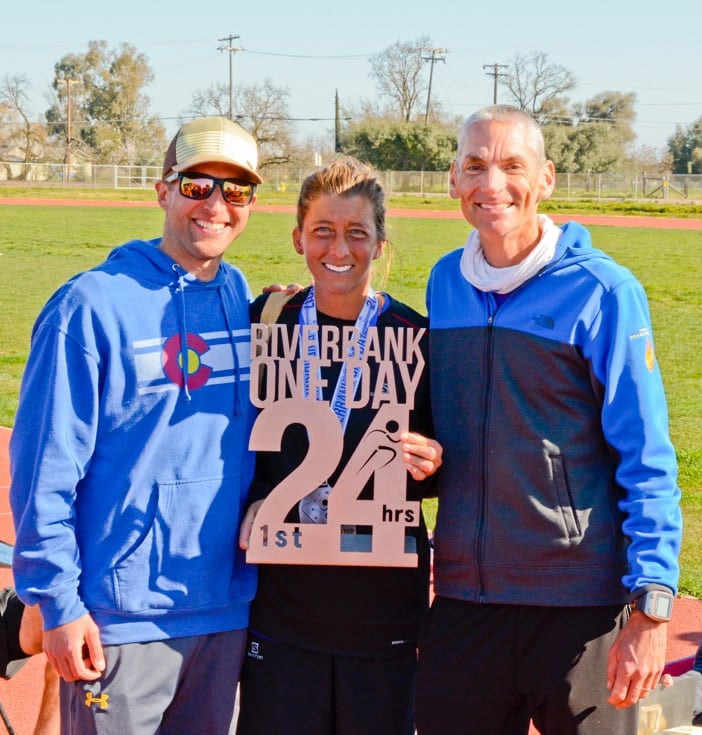Courtney Dauwalter reset the women’s 24-hour American record of 250.079 kilometers/155.391 miles at the 2017 Riverbank One Day Classic in California, which was held on February 25 and 26. The previous record was held by Sabrina Little at 152.030 miles, set in 2013. In her first interview with iRunFar, via telephone on International Women’s Day last week, Courtney talks about her background in Nordic skiing and running, her life as a schoolteacher in Colorado, how her record-setting run a few weeks ago unfolded, and how she’s now setting her running sights even higher.
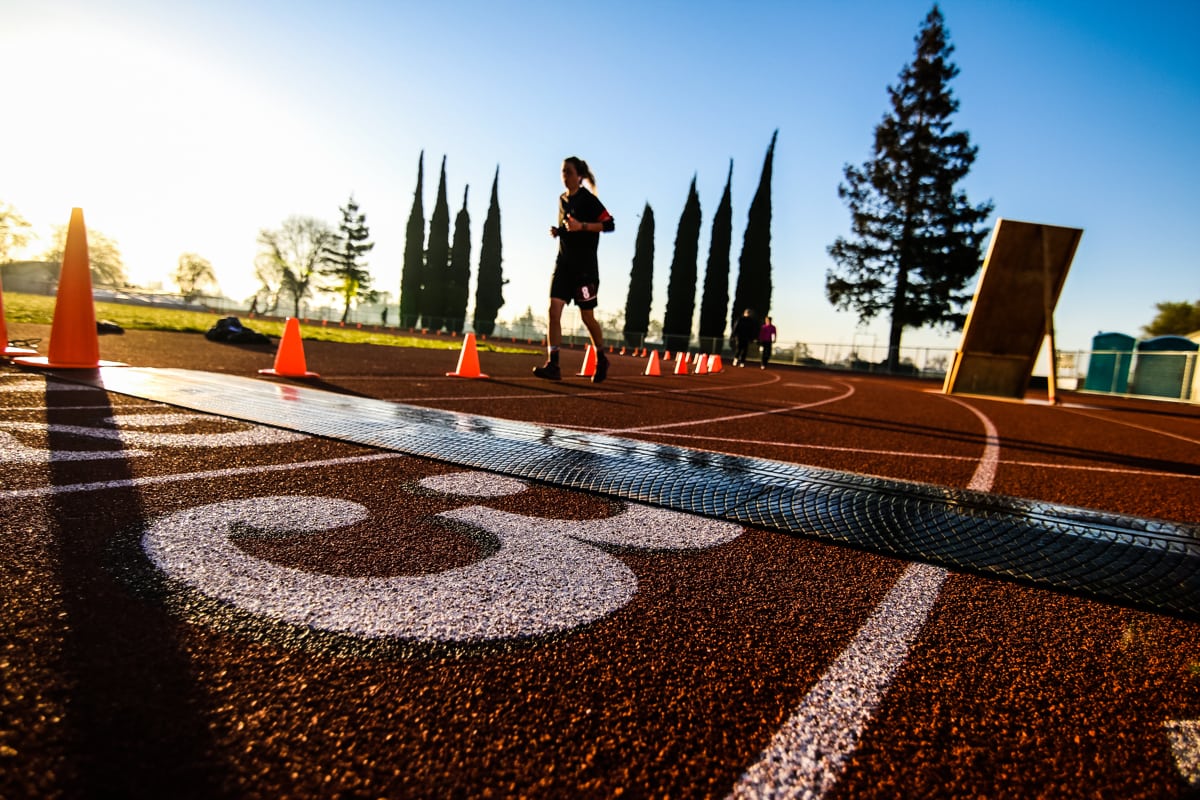
Photo: Chad Johnson of Courtney Dauwalter enroute to a new 24-hour American record at the 2017 Riverbank One Day Classic
iRunFar: You are a teacher?
Courtney Dauwalter: Yes, I am. We have a funky day today for International Women’s Day, a modified schedule. I teach at an all-girls school, so we’re taking the day to celebrate all things women and all sorts of different pieces involved in that.
iRunFar: What age do you teach? What age girls go to your school?
Dauwalter: I teach eighth-grade science. The school is a charter school that is part of Denver Public Schools that currently has sixth through 11th grades and next year will be expanding to include 12th grade. It’s been growing over the years.
iRunFar: Wow, you’re teaching girls who are right on the cusp, aren’t they? Eighth grade is such a pivotal time.
Dauwalter: It’s a pretty fun time. They’re at a cool transition to starting to be more like… kind of adult-like but definitely still have a lot of kid qualities.
iRunFar: That might be the polite way of saying it [laughs].
Dauwalter: Yeah, I’m trying [laughs].
iRunFar: Did you go straight into teaching right out of college?
Dauwalter: I took a year off to do a little traveling. Then I went into one of those teaching programs where—kind of like Teach for America, I’m not sure if you’re familiar with that—where you learn how to do it as you do it basically. You’re thrown to the wolves essentially.
iRunFar: Which is literally the case with some kids [laughs].
Dauwalter: Yeah, exactly. I did that [laughs]. It was a cool way to start a career at the same time as getting the education to do that career because I hadn’t studied teaching in undergrad. I did that in Mississippi, which was also a really cool experience.
iRunFar: Oh, yeah, wow.
Dauwalter: Yeah, it was a whole different world down there.
iRunFar: Are you actually Coloradan, or are you a migrant there?
Dauwalter: I’m a migrant. I’m from Minnesota originally.
iRunFar: What part?
Dauwalter: Right outside Minneapolis, a western suburb.
iRunFar: Which one? This is a personal curiosity. I’m from Shoreview, north of St. Paul.
Dauwalter: Oh, cool. I went to Hopkins—the Hopkins/Edina/Minnetonka area.
iRunFar: I went to Totino-Grace High school in Fridley.
Dauwalter: Okay, that’s crazy.
iRunFar: I think a lot of cool trail runners come from Minnesota. I don’t know if it’s in the water or what.
Dauwalter: [laughs] I think it’s the little bit of crazy that’s involved with growing up in Minnesota.
iRunFar: That’s true. You grow quickly tolerant of uncomfortable environmental conditions.
Dauwalter: Some people call it ‘hardy.’ That’s cool. I didn’t know you were a fellow Minnesotan.
iRunFar: Yeah, but we’ve both managed to ply the accents out of our speech.
Dauwalter: When I go home and hang out with my extended family, my accent comes back stronger.
iRunFar: Oh, it definitely does.
Dauwalter: I’ve got some uncles that are way far north with classic Minnesota accents, and you can’t help but grab it a little bit when you’re there.
iRunFar: It’s like a setting in your brain. You’ve heard it for so many years that the dial switches right back to it. Where did you go to college?
Dauwalter: I went to the University of Denver, which is what showed me how awesome Colorado is.
iRunFar: Were you a runner in high school or college?
Dauwalter: I ran all through junior high and high school on our high-school’s cross-country and track teams, but I really got into cross-country skiing. I ended up doing cross-country skiing in college at the University of Denver.
iRunFar: Your off-season training probably involved a lot of running?
Dauwalter: Yeah, for sure, a lot of running and roller skiing and a lot of hill workouts.
iRunFar: The Nordic world is a lot like the track and cross-country scene for running in that there are sprints and longer-distance stuff. Did you specialize in a certain kind of Nordic skiing?
Dauwalter: I wouldn’t say I specialized. In college racing, the college race weekends, you have to do both styles—classic and skate—and there would be two different-length races. One of the days would be a classic race in maybe a 5k, and the next day you’d race skate in maybe a 10k or a 15k, so you kind of have to be able to do all of it decent in order to be competitive. I definitely had better results in the skate races and in the longer races. I’m not much of a sprinter for sure.
iRunFar: Are you sure [laughs]? You keep trending toward, “How many miles can I fit in 24 hours?” It’s the opposite of sprinting.
Dauwalter: Exactly. No fast-twitch muscles fibers here [laughs].
iRunFar: They’ve all been converted.
Dauwalter: Exactly.
iRunFar: When you graduated from college, did you continue ski racing, or did you start following running? What was that world like transitioning from that to this?
Dauwalter: It helped that I moved to Mississippi, so skiing wasn’t even an option anymore. It kind of narrowed down the options I had to get in my need to be outside and sweat a little bit.
iRunFar: You were probably already…
Dauwalter: Oh, my gosh, I was sweating all the time. I just ran down there for fun and then decided to enter a couple road marathons just because I was curious. It gave me a goal for what I was running every day for. I also coached the cross-country team there, so I was able to get in plenty of running with the kids. It was interesting in Mississippi because no one really runs for fun where I was. I’d be out running these rural roads and people would pull over and wonder what I was running from or if I needed a ride.
iRunFar: “Do you need help? Do you not have a car?”
Dauwalter: “Do you need to go somewhere? You’re choosing to do that? That’s weird.”
iRunFar: Were road marathons your first races then for running?
Dauwalter: After the high-school cross-country world, yeah. I probably entered some 5ks and 10ks just for fun, but those were the ones where I was intentionally trying to get ready for that many miles.
iRunFar: Were you good at running when you first started? Well, okay, there’s a difference between being good at it and feeling natural. Did it feel natural? Were you also good at it?
Dauwalter: I guess as far back as I could remember, it felt good and I had some pretty good results. Even back to seventh grade.
iRunFar: Do you remember what your first marathon time was?
Dauwalter: I do. I only did a couple of them. The first one I did was 3:18, and the second one was a little bit later that year in 3:15.
iRunFar: What sort, if you can remember, what sort of training did you do to stumble into sub-3:20 marathon running?
Dauwalter: I just tried to get in some longer runs. I had some friends who were on the cross-country team with me in high school, and they are pretty successful at running marathons. They follow regimented training plans with track workouts and long runs and all of it paced out really nicely. Just having conversations with people who had done them, I decided to go the route of just trying to get some time on my feet and then see what happened.
iRunFar: You probably still had aerobic capacity built out from your high school and college running and skiing careers—it was probably that stuff left in you also.
Dauwalter: Maybe. I don’t know.
iRunFar: Why ultrarunning? Why did you decide to run your first ultra?
Dauwalter: It was a natural progression from having done the marathons and really liking those to, Well, 50k isn’t that much further. There happened to be one nearby that was on some cool trails that looped through a local park. I decided to give it a shot. I really enjoyed the whole vibe of trail running versus the little bit more manic feeling of the road marathons. Once I did the 50k, then I was super psyched to try anything longer that I could get my hands on.
iRunFar: Were you running for fun and training on trails at that point? Was it sort of natural to do a race on a trail, too?
Dauwalter: I wasn’t training on trails, but I was already running. I figured the transition between road and trails wouldn’t be too bad. The first year I was running on trails, for my birthday that year, my parents sent me this huge box of bandaids and eight bandages because I would fall so much. That was kind of a learning curve with that. It was a lifetime supply of bandaids.
iRunFar: That’s amazing. I’m sure you’ve heard the world outside of you analyze your ultrarunning career so far as like, “From the beginning of time to 2016.” And then 2016 as something separate, because last year was entirely different. Do you look at your trail and ultra ‘career’ in that same sort of way?
Dauwalter: I’m not really sure how I look at it. I’m super excited to be starting to feel like I’m figuring it all out, and at the same time as figuring it all out to be super passionate and excited about continuing to do it. I think I still have so much to learn and to figure out in the crazy distance-running thing that I’m excited to see what will happen as well.
iRunFar: Coming into 2016, you had lots of years of ultra experience, but I first heard your name when you ran the FANS 24 Hour in late spring/early summer last year. Was that right?
Dauwalter: June.
iRunFar: I can’t remember your exact mileage, but it was something like 130 or 135 miles.
Dauwalter: Yeah.
iRunFar: I was like, Okay, this is a woman who I need to pay attention to. Was that your first actual 24-hour race, or had you been doing that before?
Dauwalter: I’ve done FANS for a couple years now. When I ran my first 100 miler, which was Run Rabbit Run 100 Mile in 2012 or 2013, I DNFed it. I dropped out in the middle of the night because I was just suffering. I called it a day. After that I decided I needed to try running through the night. I think the FANS race is super close to where my parents live in Minnesota. This is a perfect opportunity to run through the night in a low-risk environment. There’s an aid station every mile. So the first time I did FANS, I made it to 100 miles, which had been my goal all night, and there was still two hours to go then. I just broke down crying. You’re kidding. I’ve been aiming for 100 miles the whole time. I finally get here, and you tell me I have to keep running for two more hours? I was a little bit angry. I think in those last two hours I only added maybe five or six more miles of just dragging my feet, whimpering… but it was cool because that first time I just wanted to prove to myself that I could run 100 miles, which would make me feel confident in entering an actual 100-mile race. The objective was met, but it was a struggle in those last couple hours.
iRunFar: Which year was that?
Dauwalter: I’m pretty sure I attempted my first 100 at Run Rabbit in 2012. Then in 2013 I did my first 24-hour race just to get 100 miles under my feet.
iRunFar: You running 135 miles in 24 hours last year, my attention being called to that is just my ignorance then. You’d had a build-up to that. It wasn’t like it came out of nowhere.
Dauwalter: Yeah, I’ve been at FANS every year since that first attempt because it’s such a cool race and cool organization. I’ve been doing them for a couple years but haven’t put it together quite as well until recently.
iRunFar: To what do you attribute the success you had in 2016?
Dauwalter: I think I got in some better training. Living in Golden, [Colorado,] I get out on the trails a ton. It’s been really exciting to explore the trails—probably, more time on my feet. Then also definitely I’ve been figuring out the mental game a little bit more and what sorts of things you might feel when you’re at those low points—that it’s not the end of the world to feel those things. That was definitely a learning process for me.
iRunFar: Let’s talk about that in the context of 24-hour races. You’ve run a bunch in just the last eight months or so and two in the last two months which is, to me, nuts—nuts in a good way. I don’t mean that disrespectfully.
Dauwalter: You can mean it however you want [laughs].
iRunFar: You must be comfortable with being uncomfortable [laughs].
Dauwalter: That’s what I’ve been trying to work on. I think, at least the best way I’ve figured out around that is just to practice it because there’s no dumbbell you can lift to strengthen your brain. It’s just putting yourself in scenarios where it’s going to hurt and be really mentally taxing, and all of those things combined can make you stronger in the end.
iRunFar: The race you just had a couple weeks ago at the Riverbank One Day—Jon Olson’s race—you ran three miles faster than the previous women’s American 24-hour record. It was a record that women had been bumping up against for years, just barely nudging it forward. Then it kind of sat there until you went and exploded through the 152-mile barrier. Had you set in your head, I want to try to experiment with the American record. I want to see how far I can go. I think I can run this pace. What was your mindset going into the event?
Dauwalter: At Desert Solstice in December, I set a new PR for me in 24-hour races and was pretty excited about that. When I started reflecting back on the race, there were three hours where I kind of dilly-dallied around and was dragging my feet and was mentally down through the middle of the night. So I wanted to have a chance of doing that part better—encountering the low points, which are inevitable, and then dealing with them in a way that wasn’t making me lose miles through the hours that were passing. So this Riverbank race ended up having a whole cast of amazing people sign up for it.
iRunFar: All these women!
Dauwalter: Oh, my gosh. I figured I might as well surround myself with greatness with the intention of trying to saddle the mental game a little bit better through the night and then see what happened.
iRunFar: Did you have in your head the various records that were out there, or were you going into it wanting to work on being strong at night?
Dauwalter: Mostly I went into it wanting to be strong through the night knowing that if I did my same pace as Desert Solstice but held on better through those night hours that I would end up with higher mileage and that would end up being close to records. I didn’t have anything specifically in mind. My husband [Kevin Schmidt] is the numbers guy for sure, so he had crunched all sorts of possibilities. We just kind of went with the flow for the first 14 hours, just to see how it was all shaking out. Then it became, This is possible if you play the head game better.
iRunFar: How did the nighttime go for you?
Dauwalter: It was pretty good. I think I finally blacked out for awhile there [laughs]. I can’t remember feeling really awful.
iRunFar: “I fully compartmentalized it. I wasn’t even present. It was amazing [laughs].”
Dauwalter: Yeah, I had some music on for awhile and was not watching the clock, which was helpful for me. There were still tons of people out there lapping the track, so it wasn’t like being out there in the middle of nowhere by myself. There was plenty of stuff going on.
iRunFar: Self-assessment, have you figured out how to do the night now?
Dauwalter: It went better. I wouldn’t say I’ve got the night figured out yet, but I’m starting to put the pieces in order a little bit better.
iRunFar: Was your husband there in the nighttime telling you, “Okay, look, this is really happening. You’re working on the American record. You’re working on way past the American record now.” When did that come to be?
Dauwalter: He was there through the night but mostly handing off bottles of liquids or calories of some sort. He didn’t say anything specific about how close I was until maybe the last four hours just because when there’s so much time left, anything can happen no matter how close you are. You could implode or explode or stop moving.
iRunFar: I feel like nutrition for what you’re doing has to be so tricky. You’re running a fairly easy pace for you, I’m presuming, but for so long that it becomes not easy. What kind of nutrition works for you?
Dauwalter: I’ve found that if I limit the variety of what I take in and just stick to what works, it serves me much better. Honey Stinger energy chews, the little gummy candies, and Honey Stinger waffles were my food, and then Gatorade, Tailwind, and water in hand bottles were my liquids. That was all.
iRunFar: Is keeping your nutrition and your energy going, is that helping your mindset through the toughest times of the night?
Dauwalter: Yeah, for sure. Nutrition and calorie intake is another piece off the puzzle I’m figuring out still—how to keep taking calories in when it’s the 16th and 17th and 18th and 20th hours where you don’t feel like taking calories in anymore. That’s hard. I’m going to continue to try and work on that.
iRunFar: Force feeding yourself?
Dauwalter: Yeah, exactly.
iRunFar: Take me to where it became a real thing to you that you were going to blow your previous PR out of the water by a lot, and you were going to set a record and not by 100 meters or a lap but by miles.
Dauwalter: I probably hit my previous PR with a little under two hours to go. When I hit 147 and I still had time on the clock, I knew it was possible if I could keep myself moving forward. Then I kind of stopped thinking about it because if you count laps on a track like that, you’ll drive yourself crazy. I tried to zone out as much as I could as I was getting closer to 150. Getting 150 felt really exciting and then it was like, Okay, this could be real. Nine laps and it would be a new record. 10 laps… That part, I know my husband was like, “Ten laps! Ten laps!” Then it was a countdown and people started getting a little excited about it. Once I broke it, there was 45 minutes left still. That part could definitely have gone better. I was doing a lot of walking through those last 45 minutes just trying to keep moving. When you hit a target like that, it’s such a mental thing and an emotional thing. You just feel so spent suddenly. Those last 45 minutes, it was pretty slow going. I was really excited when they announced that I was in the last minute, and I was going to be done soon.
iRunFar: I think there must be all these chemical reactions also happening in your body to get you to that record point, and then there’s this chemical letdown afterward. You’re probably fighting emotionally, but you’re probably also having this huge chemical fight in your body, too.
Dauwalter: Yeah, that’s a good way to describe it. I don’t know the science behind it, but that’s exactly how it feels once you get there. Nothing after that is working how it should.
iRunFar: Your body is like, “Okay…”
Dauwalter: Yeah, exactly. Suddenly, I hadn’t even noticed my legs were swollen. Suddenly, once I hit it, shoot, my knees grew extra knees. I didn’t even know if those were my legs down there.
iRunFar: Did you ever think, Well, I just will stop; this is so unnatural and uncomfortable? Was it just assumed that you’d just keep doing forward motion until you reached the end of 24 hours?
Dauwalter: I didn’t think of stopping. Anyone can saunter their way around the track for a little bit longer.
iRunFar: That was a John Muir moment?
Dauwalter: I might as well use the time, otherwise I would just be disappointed afterward if I knew I’d stopped with 45 minutes left.
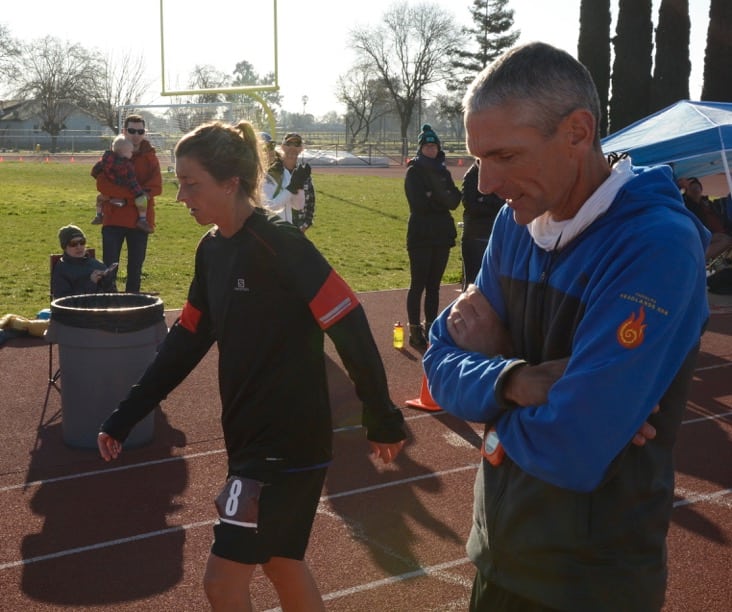
Photo: Tracey Outlaw of Courtney and race director Jon Olsen just after Courtney surpassed the previous American record
iRunFar: I read on the internet that you Facetimed with your parents during those last 45 minutes, while you were still adding on mileage to your own American record.
Dauwalter: Yes, that is correct. After setting the record I wanted to take a second to celebrate with and say ‘thank you’ to my parents, who had been watching and supporting from Minnesota. I probably walked 100 meters or so with them on Facetime before carrying on with the walk/jog combo that brought me through the remaining time.
iRunFar: That’s awesome. I love it. You are a Team USA member for the IAU 24-Hour World Championships this summer. How do you transition yourself mentally from, I just blew the women’s American record out of the water; I feel like I should sit on the couch and enjoy that, to, Now I’m going to be facing all the women who are really good at this in the world? You just achieved a really cool thing, but now, looming on the not-so-distant horizon is going out and doing it again.
Dauwalter: Yeah, I’m just feeling really excited and thankful. I’m so excited to be on the team with the women who are slotted onto the team so far. I hope to learn from them and contribute positively. I’m also excited about this record that just happened. That’s also just sinking in. Also, life is still happening, and there are still things to do and work to be done and improvements to make on that pacing and nutrition for 24 hours. I’m excited to just get back to the training and start thinking through how I can put together an even-better 24-hour race.
iRunFar: Interesting for me, usually I interview people within a couple days of a race, so people hate their bodies and their bodies hate them. It’s been a couple weeks now since your record. How are you feeling?
Dauwalter: I’m feeling really good now. The first couple days were pretty terrible. If we’d spoken then, you’d have been getting that same message. But I’m back out now doing some easy runs. My legs and body are feeling recovered and good. I’m excited.
iRunFar: The IAU 24-Hour World Championships are in July, which is four-and-a-half months from now or something like that?
Dauwalter: Soon.
iRunFar: How do you train for a 24-hour race? I literally can’t fathom how a person trains.
Dauwalter: I’m no expert on training for sure. I just try and get in long runs and time on the feet. Sometimes I’ll get in a couple runs per day. As far as I understand training to be, it’s a pretty normal type of training for going into a 24-hour race.
iRunFar: What does an actual long run look like? Do you go out and run on the roads, the trails, do you go near a track?
Dauwalter: I have not done any training runs on tracks. From my house, I can get on some pretty cool loops that involve a lot of trails and sometimes a little bit of road. That’s my go-to is just to run from my house and see where I end up in the foothills of Colorado.
iRunFar: The amount of time you’re out, what does that look like?
Dauwalter: I guess the longest ones I did leading up to Riverbank were maybe four or five hours out on the trails.
iRunFar: Amazing, and then you go and run 155 miles in 24 hours.
Dauwalter: I guess training appropriately might be another puzzle piece I’m trying to figure out.
iRunFar: That’s the thing, what you’re doing is such a tricky type of racing… People who are racing 100 miles on trails go out and do eight-hour training runs on the trails, but on the trails you’re just not running the entire time–in the training or the racing. But when you’re on a track or a one-mile loop course or whatever that environment is, you’re literally running the entire time. I imagine there’s only so much of that you can do in your training before you’re broken.
Dauwalter: Right. Yeah, it’s an interesting balance. I’ll let you know if I figure it out.
iRunFar: Clearly you have!
Dauwalter: Well, thank you.
iRunFar: You’re the American-record holder. You’ve run 155 point how many miles? I know they ended up needing to measure your final lap. What was the official mileage total?
Dauwalter: They haven’t released the official results, but I think it was 155.3-ish, or something in that ballpark.
iRunFar: Maybe a few more inches.
Dauwalter: Yeah, I mean, they better count every inch [laughs].
iRunFar: [laughs] I want to ask you a couple full-spectrum questions. All of a sudden there is a lot of attention on you and your newfound prowess in racing long stuff. What does that feel like to you? You’re going to be one of the favorites going into the world championships in July. You seem so calm in chatting. Does that outside attention sort of wash over you, or do you start to feel that at some point?
Dauwalter: It feels really strange to think that I’m holding an American record. The feeling when I think about worlds is that I just feel really honored that I have this opportunity to get to go there and join some of these fantastic U.S. women on what should be a pretty strong team in Ireland.
iRunFar: Yeah, really strong.
Dauwalter: It all feels really crazy to me. I wouldn’t say any of it has sunk in, but I feel really grateful for the opportunities that are happening and the people I’ve gotten to meet who have helped along the way.
iRunFar: I really liked something you said a few minutes ago about how there’s still other things going on in the world like your job and your life. When you improve to such a capacity that there are high expectations of self and the external expectations of you to perform… but really, at the end of the day, running is still a hobby. You have a lot of other things going on in your world. How do you put this into the context of real life?
Dauwalter: How do I balance it?
iRunFar: Yeah… You’re a teacher. You’ve got kids who are literally learning how to be good human beings. You have a really important role in your real life.
Dauwalter: Running is the thing I get to do to process through all the real-life stuff. Just getting out and spending time on the trails is an escape for me to do a lot of thinking or socializing with some of my friends to just try and soak up all the beauty of Colorado. I don’t know that I’ve found the perfect balance between work and running and life things, but I do incorporate running into a lot of the other life things, if that makes sense.
iRunFar: At the end of the day, it’s your way of experiencing the natural world or decompressing or just enjoying life with people rather than, “I’m training for Ireland in July?”
Dauwalter: Exactly. My husband and I will go on runs where we end up at breweries and meet our friends there and walk our way home from it. Our favorite vehicle for adventure is going on runs together and just kind of seeing what we can make happen while we’re out there.
iRunFar: Thank you so much for talking to me.
Dauwalter: Thank you.
iRunFar: It’s International Women’s Day, and you teach at a girls’ school. You said you have an altered schedule today. How does that work at your school?
Dauwalter: They planned out a day celebrating all sorts of women, so women in science, women in sports. It’s a totally alternate schedule to the normal class schedule. It should be a cool experience for the kids.
iRunFar: Thanks, Courtney.
